2019 All-America City Finalist – Cornelius, OR
Application Summary for the All-America City Awards:
After experiencing drastic demographic changes—going from a 70% white and 30% Latino/Hispanic population to a 42% white and 52.5% Latino/Hispanic population—Cornelius began actively engaging its Latino community.
In 2012, the city began a partnership with Centro Cultural to jointly co-host Spanish-speaking Town Halls with a translator for English speakers. Speakers at the 21 Spanish-speaking Town Halls have included community partners and agencies and guests from the U.S. Immigration Department and ICE, who answered questions about current laws and issues of interest to Latino community members. The city also provides all printed and online publications in Spanish and English. Additionally, the city is in regular communication and has partnerships with the various Latino organizations in the county, with a strong bond of communication and engagement with the local St. Alexander’s Catholic Church (parishioners are mostly Latino/Hispanic). The city regularly encourages Latino/Hispanic participation on boards and commissions by promoting opportunities directly through Latino organizations and partners in the community.
Three project examples showing how this community leverages civic engagement, collaboration, inclusiveness and innovation to successfully address local issues:
1.) Finding Downtown and Creating a Meaningful Core
The City of Cornelius’ downtown has long been underdeveloped and unfinished. With the help of a grant, the city was able to undertake a significant community-wide outreach effort to establish a Downtown Plan.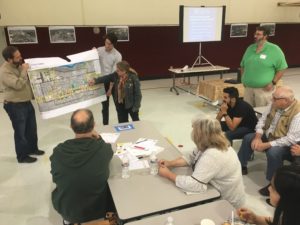
The advance work and outreach for the Downtown Plan involved the entire community. Nearly 500 surveys were returned to the city. In addition, multiple poster boards at high foot-traffic locations netted nearly 1,300 unique responses. Bi-lingual teams at twelve large community events solicited responses, opinions and ideas. This process reached hundreds of individuals and households through a Vision Ideation Session, online survey, community conversations, stakeholder interviews, and intercept surveys at local events. Additionally, the city’s new Youth Advisory Council (YAC) held a special nighttime meeting to provide valuable input for the project.
Residents were asked what they wanted in their new downtown urban core, how it should look, and what can be done to encourage more private investment and employment growth in the core. Key findings included the following ideas: build on existing assets, diversify amenities and services, improve traffic congestion and safety, add community spaces and events, and enhance livability for all residents.
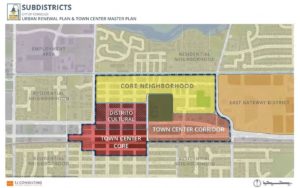 The plan is still being implemented, but so far, the community has been able to undertake projects to reduce traffic congestion and improve walkability. Additionally, the city has formed a stronger Chamber of Commerce with a neighboring city and reestablished the Economic Development Commission (EDC) to be more reflective of the city’s diverse community and businesses.
The plan is still being implemented, but so far, the community has been able to undertake projects to reduce traffic congestion and improve walkability. Additionally, the city has formed a stronger Chamber of Commerce with a neighboring city and reestablished the Economic Development Commission (EDC) to be more reflective of the city’s diverse community and businesses.
2.) Reforming the Police Department for a Better Place to Live, Work & Play!
In 2012, a City of Cornelius police officer delivered a letter to the city manager, expressing his and others displeasure with the police chief. A third-party agency consulted with the community and interviewed approximately 50 people both within and outside the department. The investigation found that the Latino community was generally frightened of the police department and that significant management deficiencies and inequitable processes existed.
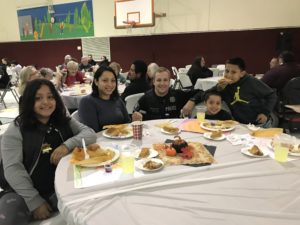
The police chief was placed on administrative leave and an interim police chief began taking strides to improve the department from within. The new chief also worked with community organizations to improve relations with residents. Despite some success, he ultimately retired, citing an irreparable toxic environment.
After this latest development, the city began negotiations with the Washington County Sheriff to provide contracted police services to the city. The city held three public meetings to hear what people had to say; community members provided input and comment, including leaders of the Latino community. In addition, a Spanish-speaking Town Hall was held jointly with Centro Cultural and attracted over 100 members of the Latino community. Washington County Sheriff Pat Garrett attended and spoke entirely in Spanish to those present. Those in attendance voted unanimously to support having the Washington County Sheriff’s Office contract for police services.
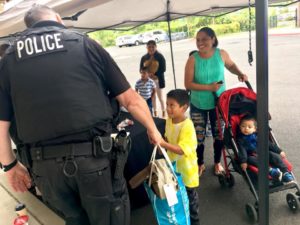 In 2014 a three-year contract was approved unanimously and was extended by five-years in 2017. The Latino community is fully supportive of the change and believes that the new police department has had their best interests at heart.
In 2014 a three-year contract was approved unanimously and was extended by five-years in 2017. The Latino community is fully supportive of the change and believes that the new police department has had their best interests at heart.
3.) The New Cornelius Library: A Literacy Center for the Entire Community
In 2004, the need for a cultural center and library was identified by the Main Street District Plan. A bond, including the library and community center, failed but resulted in a committee of dedicated volunteers that kept the library and community center vision alive. In 2010, a private donor funded a library feasibility study that included community meetings and a public forum with attendees sharing what features they wanted in the project.
With public support behind them, the library committee began seeking a partner to occupy floors above the library to make the project both financially feasible and to better utilize limited downtown space. They eventually found a partner in a nonprofit, low-income housing developer interested in providing senior housing. With a new partner to split the expenses with, The Cornelius Place mixed-use project was approved unanimously by the city council.
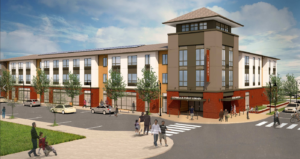 The community of Cornelius has proudly raised $5.2 million to-date, with more than 200 individuals and 44 businesses contributing. Oregon Foundations, public funding, and the city covered the remaining shortfall.
The community of Cornelius has proudly raised $5.2 million to-date, with more than 200 individuals and 44 businesses contributing. Oregon Foundations, public funding, and the city covered the remaining shortfall.
The newly constructed building, Cornelius Place, now houses a library and learning center on the first floor and affordable senior housing on the second and third floors. The new library is ideally located in the town center, on a bus line and within walking distance of almost all residents. To increase inclusiveness and equity, the library recruits bilingual and Latino volunteers and staff.
Some Related Posts
Thank You to Our Key Partners



